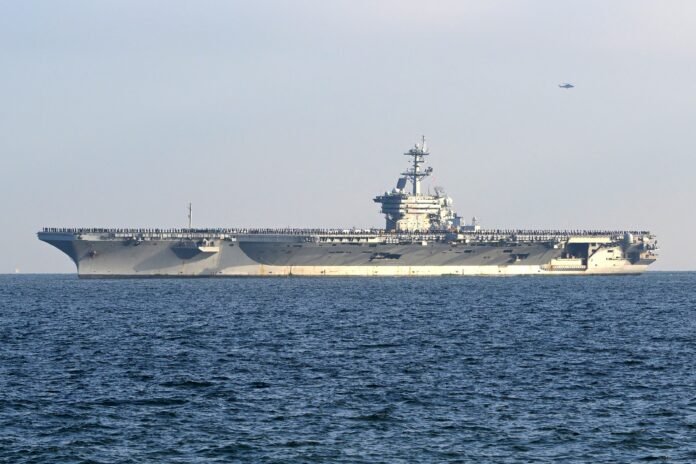Washington, D.C., should scale back its military presence on China’s doorstep to ease tensions with Beijing and adopt a more defensive posture, analysts of the “restraint” camp argue in a new report.
Their proposals, published Wednesday by Washington, D.C., think tank Defense Priorities, include slashing the number of troops stationed in South Korea by over 60 percent and those in Japan’s Okinawa by nearly one-third.
Newsweek reached out to the U.S. Department of Defense via email with a request for comment.
Why It Matters
Since his first term in office, President Donald Trump‘s orbit has included a number of “restrainers”—advocates of a less interventionist foreign policy—including Vice President JD Vance and former White House chief strategist Steve Bannon.
Of the 200,000 U.S. military personnel stationed at hundreds of bases worldwide, nearly half are based in defense treaty allies Japan and South Korea, along with a wide array of other naval and air capabilities. The proximity of these forces to China is a source of tensions, with Beijing seeks to supplant the U.S. as the dominant power in the region.
Problems Identified
“Asia is the region where the U.S. has the most significant interests at stake, and where the U.S. faces the fiercest competitor in China,” the authors wrote. Because China now possesses the strength to deny the U.S. regional dominance, the U.S. must seek to maintain a balance of power, rather than permanent supremacy, per the report.
This would mean scaling back deployments that could further escalate tensions with China—such as U.S. military trainers currently stationed in Taiwan, the self-ruled island Beijing claims as its territory—or contentious weapons systems that could trigger a regional arms race.
The authors argue that U.S. forces are too heavily concentrated in a few sites along the so-called First Island Chain—the arc of islands stretching from Japan to Indonesia that the Pentagon sees as key to containing China in a conflict.

Jiji Press/AFP via Getty Images
Many of these bases, especially those in southwestern Japan, would be particularly vulnerable to strikes by China’s vast missile arsenal.
The report urges the U.S. to accelerate efforts to spread out some of its forces, particularly across the Second Island Chain in the Pacific, including the U.S. territory of Guam.
Host countries themselves present additional complications, the authors note, including limits on U.S. military access and reluctance among local authorities to host American ground forces or operations—as seen during a series of controversies in Okinawa.
Meanwhile, U.S. partners, especially Japan and the Philippines, remain heavily reliant on U.S. military support as their “Plan A” for security emergencies, the report says.
While Japan and Taiwan—which face an existential threat in the form of China—have modestly raised their defense budgets, these increases are not commensurate with the security challenges they face, according to the authors.
Redeploying U.S. forces, they contend, would reduce “free-riding” and require allies to take on more responsibility for their own defense.
Recommendations
The report calls for a sharp reduction in U.S. forces in South Korea, from nearly 29,000 to 10,000, consisting mainly of logistics and combat support personnel and two of the current four fighter squadrons.
In Japan, the authors recommend reducing U.S. troops levels by about 8,000, leaving a total of 45,000—including 9,000 Marines and a single fighter squadron in Okinawa.
The report also calls for one of the Okinawa-based fighter squadrons to be moved farther north, to either the Misawa or Yokota Air Base.
Roughly 5,000 of the troops pulled from Okinawa should be distributed among the second island chain, including Guam as well as Palau, and the Marshall Islands—both of which share long-term security agreements with the U.S., per the report.
The paper also recommends withdrawing all 500 U.S. military training personnel from Taiwan. “A balancing approach does not require a direct U.S. military defense of Taiwan, however, as the tiny island would not dramatically shift the balance of power,” the authors wrote.
The U.S. is the island’s primary arms supplier, though Washington has carefully maintained a policy of “strategic ambiguity” on whether it would come to the island’s defense.
Bonnie Glaser, managing director of the U.S. Indo-Pacific Program at the German Marshall Fund, told Newsweek the report’s assessment of Taiwan underestimated its value to U.S. strategic interests in the region.
“I would argue that the ‘tiny island’ they refer to is the U.S.’s eighth-largest trading partner, produces over 90 percent of all the advanced semiconductors globally, and U.S. failure to defend it would likely accelerate the existing tendencies of U.S. allies in the region to adopt more independent policies, including potentially developing nuclear weapons,” she warned.


























